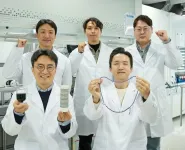(Press-News.org) Electronic cigarettes use may pose lower cardiovascular risks in people living with HIV compared to tobacco cigarette use, new UCLA-led research shows. The study, published in JAHA, uses a novel laboratory model to examine the early stages of atherogenesis—the buildup of fats and cholesterol in the arteries. The findings suggest that electronic cigarettes (ECs) have a lower likelihood of causing changes associated with atherogenesis, compared to tobacco cigarettes (TCs), among those living with HIV.
While smoking has dropped to all-time low levels in the U.S., this hasn’t been the case for people living with HIV, who are disproportionately affected by tobacco-related health disparities. “Tobacco smoking is the leading cause of preventable cardiovascular death in the U.S., and people living with HIV/AIDs smoke at rates two to three times higher than the general population,” said Dr. Holly Middlekauff, a cardiologist and professor of medicine and physiology at the David Geffen School of Medicine at UCLA and corresponding author of the study. “Our findings suggest that switching to electronic cigarettes could be a promising harm reduction strategy for this vulnerable population.”
As part of the three-day study, researchers recruited people living with HIV aged 21-60 who smoked tobacco cigarettes. On separate days, participants smoked a tobacco cigarette, an electronic cigarette, or puffed on an empty straw (control) in random order. Blood samples and electrocardiograms were taken before and after each exposure and special lab tests assessed the blood’s propensity for causing atherogenesis, with tobacco cigarettes having the strongest effect.
Researchers believe this data would benefit from a larger clinical trial looking at cardiovascular risks of electronic cigarettes in people living with HIV who smoke tobacco. “This is an important area of study as it could determine if switching completely to electronic cigarettes as part of a harm reduction strategy would satisfy the powerful addiction to nicotine while ultimately reducing future heart attack risk for those living with HIV,” Middlekauff said.
END
E-cigarettes linked to lower cardiac risks compared to tobacco cigarettes in people with HIV
Study suggests switching to e-cigarettes may help reduce the risk of future heart attacks
2025-03-19
ELSE PRESS RELEASES FROM THIS DATE:
High levels of traumatic stress found in caregivers of adult cancer patients
2025-03-19
Toronto, Canada – Every year, millions of family members and friends provide care for loved ones undergoing cancer treatment, often at great emotional cost. A new scoping review, published this week in Archives of Geriatrics and Gerontology Plus, confirms the toll that this work can take on caregivers’ mental health. According to the review, most studies show that more than 15% of those who care for loved ones with cancer suffer from post-traumatic stress disorder (PTSD).
“Caregivers remain largely overlooked in psychosocial oncology care, leaving many without the support they need,” says lead author Elizaveta Klekovkina, ...
New carbon-negative material could make concrete and cement more sustainable
2025-03-19
Using seawater, electricity and carbon dioxide (CO2), Northwestern University scientists have developed a new carbon-negative building material.
As Earth’s climate continues to warm, researchers around the globe are exploring ways to capture CO2 from the air and store it deep underground. While this approach has multiple climate benefits, it does not maximize the value of the enormous amounts of atmospheric CO2.
Now, Northwestern’s new strategy addresses this challenge by locking away CO2 permanently and turning it into valuable materials, which can be used to manufacture concrete, cement, plaster and paint. The process to generate ...
Researchers optimize a method using seawater that produces mineral deposits while trapping carbon dioxide
2025-03-19
The ocean can be harnessed to absorb carbon dioxide from the atmosphere, effectively storing it in water layers and acting as a carbon sink. In research published in Advanced Sustainable Systems, investigators optimized an electrochemical method called seawater splitting for trapping and sequestering carbon dioxide into stable solid mineral deposits.
When applying voltage or current to seawater during seawater splitting, or electrolysis, hydrogen gas evolves at the cathode, while oxygen or chlorine gas is generated at the anode. Deposits of carbon-trapping minerals ...
How might ACL surgery increase the risk of knee osteoarthritis?
2025-03-19
Some individuals who have had anterior-cruciate-ligament reconstruction (ACLR), the kind of surgery often performed on athletes’ knees, may develop early-onset knee osteoarthritis. A new study in the Journal of Orthopaedic Research indicates that altered knee joint movement after ACLR could be a contributing factor.
The study used a unique dynamic X-ray imaging system to accurately measure knee joint movement during walking in people who had undergone ACLR surgery and those with healthy knees. Compared with healthy controls, ACLR patients had a higher vertical position of the patella and a higher location of articular contact between the patella and the ...
Is the “honesty” of flowering plants to their pollinators genetic?
2025-03-19
Flowers can produce showy displays that appeal to pollinating insects or animals, but some “cheat” by enticing pollinators but not rewarding them with nectar. Research in New Phytologist indicates that the tendency of flowers to be “honest” and reward pollinators with nectar is partly genetic, meaning that it can be passed down through generations.
In the study, researchers investigated floral honesty in the Mexican endemic Turnera velutina (Passifloraceae), analyzing multiple genetically distinct plants ...
Monica Hsiung Wojcik, MD, MPH, FAAP, FACMG is the recipient of the 2025 Dr. Michael S. Watson Genetic and Genomic Medicine Innovation Award from the ACMG Foundation for Genetic and Genomic Medicine
2025-03-19
Monica Wojcik, MD, MPH, FAAP, FACMG is the recipient of the ACMG Foundation for Genetic and Genomic Medicine’s 2025 Dr. Michael S. Watson Genetic and Genomic Medicine Innovation Award—the “Watson Award”—named for the American College of Medical Genetics and Genomics’ first and longstanding executive director, Michael S. Watson, MS, PhD, FACMG.
“I am incredibly thrilled and humbled to receive this award, and I hope that my career will continue to honor the legacy of Dr. Watson, towards a future where all families can receive the care that they want and need, empowered by genetics and genomics,” said Dr. Wojcik.
“The ...
Kiely N. James, PhD, FACMG receives the 2025 Richard King Award for Best Publication by a Trainee in Genetics in Medicine
2025-03-19
Kiely N. James, PhD, FACMG is the recipient of the 2025 Richard King Trainee Award. This award was instituted by the ACMG Foundation for Genetic and Genomic Medicine to encourage American Board of Medical Genetics and Genomics (ABMGG), international equivalents, or genetic counseling trainees in their careers and to foster the publication of the highest quality research in Genetics in Medicine (GIM), an official journal of the ACMG.
Each year the editorial board reviews all articles published in GIM by eligible trainees who were either a first or corresponding author during that year. The manuscript considered to have the ...
The ACMG Foundation for Genetic and Genomic Medicine presents four next generation Fellowship Awards at the 2025 ACMG Annual Clinical Genetics Meeting
2025-03-19
Each year, the ACMG Foundation for Genetic and Genomic Medicine grants its Next Generation Fellowship awards to promising early career professionals in a range of medical genetics and genomics specialties including Clinical Genetics, Clinical Biochemical Genetics, Laboratory Genetics and Genomics, Medical Biochemical Genetics and Ophthalmic Genetics. Support for this year’s class of fellows was generously provided by Bionano, Pfizer, Sanofi, Spark Therapeutics, and Takeda. The ACMG Foundation depends on corporate donations ...
Marine animals help solve ocean issues
2025-03-19
Sensors attached to animals gather valuable data to track and mitigate the human influence on marine life. The Kobe University review paper emphasizes the importance of integrating data from various sources and advocates for an “Internet of Animals” based on open access and shared standards.
Humanity influences marine life through a broad range of activities, spanning from fishing and pollution to noise from boats, construction and mining. To enable a sustainable life together, we need to monitor the influence of our activities on marine life and use this ...
CNT wires for wearable electronic devices from the existing fiber manufacturing process!
2025-03-19
Dr. Han Joong Tark's team at KERI's Nano Hybrid Technology Research Center has successfully fabricated ‘functional wires’, which are the foundation of wearable electronic devices, by directly applying the existing synthetic fiber processing methods.
Wearable electronic devices, which can be attached to or worn on the body, such as on the wrist, ear, or eyes, have long become a part of our daily lives in various forms like smartwatches, glasses, and earphones. The key to these devices is that they must be lightweight while maintaining long-lasting performance. While there have been various efforts to achieve this, one of the most important elements is the conductive ...
LAST 30 PRESS RELEASES:
FAU Harbor Branch awarded $900,000 for Gulf of America sea-level research
Terminal ileum intubation and biopsy in routine colonoscopy practice
Researchers find important clue to healthy heartbeats
Characteristic genomic and clinicopathologic landscape of DNA polymerase epsilon mutant colorectal adenocarcinomas
Start school later, sleep longer, learn better
Many nations underestimate greenhouse emissions from wastewater systems, but the lapse is fixable
The Lancet: New weight loss pill leads to greater blood sugar control and weight loss for people with diabetes than current oral GLP-1, phase 3 trial finds
Pediatric investigation study highlights two-way association between teen fitness and confidence
Researchers develop cognitive tool kit enabling early Alzheimer's detection in Mandarin Chinese
New book captures hidden toll of immigration enforcement on families
New record: Laser cuts bone deeper than before
Heart attack deaths rose between 2011 and 2022 among adults younger than age 55
Will melting glaciers slow climate change? A prevailing theory is on shaky ground
New treatment may dramatically improve survival for those with deadly brain cancer
Here we grow: chondrocytes’ behavior reveals novel targets for bone growth disorders
Leaping puddles create new rules for water physics
Scientists identify key protein that stops malaria parasite growth
Wildfire smoke linked to rise in violent assaults, new 11-year study finds
New technology could use sunlight to break down ‘forever chemicals’
Green hydrogen without forever chemicals and iridium
Billion-DKK grant for research in green transformation of the built environment
For solar power to truly provide affordable energy access, we need to deploy it better
Middle-aged men are most vulnerable to faster aging due to ‘forever chemicals’
Starving cancer: Nutrient deprivation effects on synovial sarcoma
Speaking from the heart: Study identifies key concerns of parenting with an early-onset cardiovascular condition
From the Late Bronze Age to today - Old Irish Goat carries 3,000 years of Irish history
Emerging class of antibiotics to tackle global tuberculosis crisis
Researchers create distortion-resistant energy materials to improve lithium-ion batteries
Scientists create the most detailed molecular map to date of the developing Down syndrome brain
Nutrient uptake gets to the root of roots
[Press-News.org] E-cigarettes linked to lower cardiac risks compared to tobacco cigarettes in people with HIVStudy suggests switching to e-cigarettes may help reduce the risk of future heart attacks


